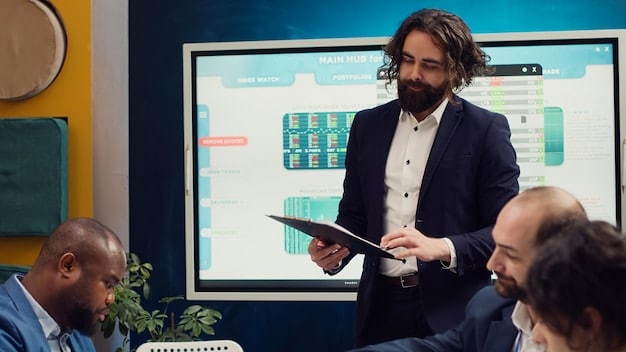Teacher Certification Updates: Navigating New US Requirements

Recent Updates: Understanding the New Requirements for Teacher Certification in the US involves staying informed about evolving educational standards, assessment methods, and professional development mandates implemented by state and national boards to ensure educators meet contemporary teaching benchmarks.
Navigating the ever-changing landscape of education requires educators to stay informed about the most Recent Updates: Understanding the New Requirements for Teacher Certification in the US. These updates ensure that teachers are equipped with the skills and knowledge necessary to meet the evolving needs of students and schools. Let’s dive into what these changes entail and how they might affect you.
Understanding the Shifting Sands of Teacher Certification
Teacher certification is not a static process; it evolves to reflect current educational research, pedagogical best practices, and societal demands. Recent changes to certification requirements across the United States aim to enhance teacher quality and student outcomes.
Increased Emphasis on Practical Skills
One significant trend is the growing emphasis on practical teaching skills. Teacher preparation programs and certification assessments are now designed to ensure that educators can effectively manage classrooms, implement evidence-based instructional strategies, and differentiate instruction to meet diverse student needs.
Technology Integration
Another key update involves the integration of technology into teaching practices. With the rise of digital learning tools, educators must demonstrate proficiency in using technology to enhance instruction, assess student learning, and communicate with parents and stakeholders.
- Proficiency in using educational software and platforms.
- Ability to create engaging digital learning experiences.
- Understanding of online safety and digital citizenship.
- Effective use of technology for student assessment and feedback.

In summary, the shifting landscape of teacher certification underscores the importance of practical skills, technology integration, and ongoing professional development to ensure that educators are well-prepared to meet the challenges of modern classrooms.
Core Competencies Now Required for Certification
At the heart of teacher certification updates are core competencies that define what effective educators should know and be able to do. These competencies span various domains, from subject matter expertise to pedagogical skills and professional dispositions.
Subject Matter Expertise
A deep understanding of the subject matter is fundamental to effective teaching. Certification updates often include rigorous content assessments that evaluate educators’ knowledge and skills in their respective fields.
Pedagogical Skills
Beyond subject matter expertise, educators must possess strong pedagogical skills to effectively translate content into meaningful learning experiences. This includes the ability to plan and deliver engaging lessons, assess student learning, and provide differentiated instruction.
- Lesson planning and curriculum development
- Classroom management strategies
- Assessment and data analysis
- Differentiated instruction
Recent updates to teacher certification highlight the critical role of core competencies in ensuring that educators are equipped with the knowledge, skills, and dispositions necessary to promote student success in diverse learning environments.
Navigating Changes in Assessment Methods
Assessment methods used for teacher certification are also undergoing significant changes. Traditional standardized tests are being supplemented with performance-based assessments that provide a more holistic evaluation of teaching effectiveness.
Performance-Based Assessments
Performance-based assessments require teacher candidates to demonstrate their skills in real-world settings. This may involve submitting teaching portfolios, conducting classroom observations, or participating in simulated teaching scenarios.
Portfolio Development
Building a professional teaching portfolio is becoming an increasingly common requirement for teacher certification. Portfolios showcase candidates’ instructional skills, assessment practices, and reflective abilities.

- Collecting and analyzing student work samples
- Reflecting on teaching practices and identifying areas for improvement
- Collaborating with colleagues to enhance instructional effectiveness
- Using technology to showcase teaching accomplishments
Changes in assessment methods reflect a shift towards more authentic and comprehensive evaluations of teacher competence, moving beyond traditional standardized tests to incorporate performance-based assessments and portfolio development.
The Role of Professional Development in Maintaining Certification
Once educators are certified, ongoing professional development is essential for maintaining and enhancing their skills. Many states now require teachers to complete a certain number of professional development hours or credits to renew their certifications.
Continuing Education Requirements
Continuing education requirements vary by state but typically include coursework, workshops, conferences, and professional learning communities. These activities are designed to keep educators up-to-date on current research, best practices, and policy changes.
Specialized Training Programs
In addition to general professional development, some states offer specialized training programs for teachers working with specific student populations, such as English language learners or students with disabilities. These programs provide educators with targeted strategies and resources to meet the unique needs of their students.
Ongoing professional development plays a critical role in ensuring that teachers remain effective and responsive to the changing needs of students and schools. Continuing education requirements and specialized training programs are essential components of maintaining certification and promoting continuous growth.
Impact on Current and Aspiring Teachers
The recent updates to teacher certification have significant implications for both current and aspiring educators. These changes may require teachers to update their skills, pursue additional training, and adapt their teaching practices.
Adapting to New Standards
Current teachers may need to adjust their instructional strategies and assessment methods to align with new certification standards. This may involve participating in professional development workshops, collaborating with colleagues, or seeking support from mentors and instructional coaches.
Preparing for Certification Exams
Aspiring teachers should be aware of the updated certification requirements and prepare accordingly. This includes enrolling in accredited teacher preparation programs, taking practice exams, and seeking guidance from experienced educators.
The impact of recent updates to teacher certification extends to both current and aspiring teachers, requiring them to adapt to new standards, update their skills, and seek ongoing professional development to meet the evolving demands of the profession.
Resources and Support for Navigating the Changes
Navigating the complexities of teacher certification updates can be challenging, but numerous resources and support systems are available to assist educators. These resources include state departments of education, professional organizations, and online learning platforms.
State Departments of Education
State departments of education provide comprehensive information about teacher certification requirements, assessment methods, and professional development opportunities. Educators can access this information through state websites, newsletters, and conferences.
Professional Organizations
Professional organizations, such as the National Education Association (NEA) and the American Federation of Teachers (AFT), offer resources, advocacy, and networking opportunities for educators. These organizations also provide professional development programs and support for teachers facing certification challenges.
- Online courses and webinars
- Mentoring programs
- Peer support groups
- Access to research and best practices
By leveraging these resources and support systems, educators can navigate the changes in teacher certification with greater confidence and success, ensuring that they meet the requirements and continue to grow as professionals.
| Key Area | Brief Description |
|---|---|
| 📚 Subject Matter Expertise | Deep knowledge in the specific subject area. |
| 🍎 Pedagogical Skills | Effective teaching methods and classroom management. |
| 💻 Technology Integration | Use of technology to enhance teaching and learning. |
| ⚙️ Professional Development | Ongoing training and learning to stay current. |
Frequently Asked Questions (FAQ)
▼
The main changes include a greater emphasis on practical teaching skills, technology integration, and performance-based assessments, ensuring educators are well-prepared and up-to-date with modern teaching practices.
▼
Current teachers can adapt by participating in professional development workshops, collaborating with colleagues, and seeking support from mentors. Staying informed and proactive is key to meeting updated standards.
▼
Aspiring teachers can access resources from state departments of education and professional organizations like NEA and AFT. These provide guidance, preparation materials, and networking opportunities to succeed.
▼
Technology integration is vital due to rise of digital learning tools, improving instruction, assessing students effectively, and engaging better with parents and other stakeholders. Today’s world is ever evolving- education must be too.
▼
Ongoing professional development ensures teachers stay current with research, best practices, and policies. It helps maintain certification and enhances teaching skills, supporting continuous improvement and excellence in education.
Conclusion
Staying informed about recent updates in teacher certification is crucial for educators to remain effective and compliant. By understanding these changes and leveraging available resources, teachers can continue to provide high-quality education and positively impact students’ lives. Embracing these updates ultimately contributes to a stronger and more prepared teaching workforce in the US.





